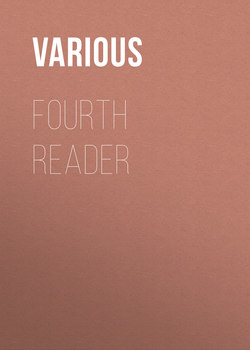Читать книгу Fourth Reader - Various - Страница 18
THE BATTLE OF BALAKLAVA
ОглавлениеThe cavalry, who had been pursuing the Turks on the right, are coming up to the ridge beneath us, which conceals our cavalry from view. The heavy brigade in advance is drawn up in two lines. The first line consists of the Scots Greys and of their old companions in glory, the Enniskillens; the second, of the 4th Royal Irish, of the 5th Dragoon Guards, and of the 1st Royal Dragoons. The Light Cavalry Brigade is on their left, in two lines also. The silence is oppressive; between the cannon bursts one can hear the champing of bits and the clink of sabres in the valley below. The Russians on their left drew breath for a moment, and then in one grand line dashed at the Highlanders. The ground flies beneath their horses’ feet; gathering speed at every stride, they dash on towards that thin red streak topped with a line of steel.
As the Russians come within six hundred yards, down goes that line of steel in front and out rings a rolling volley of musketry. The distance is too great; the Russians are not checked, but still sweep onward through the smoke, with the whole force of horse and man, here and there knocked over by the shot of our batteries above.
With breathless suspense every one awaits the bursting of the wave upon the line of Gaelic rock; but ere they come within a hundred and fifty yards, another deadly volley flashes from the levelled rifles, and carries death and terror into the Russians. They wheel about, open files right and left, and fly back faster than they came. “Bravo, Highlanders! well done!” shout the excited spectators. But events thicken. The Highlanders and their splendid front are soon forgotten; men scarcely have a moment to think of this fact, that the 93d never altered their formation to receive that tide of horsemen. “No,” said Sir Colin Campbell, “I did not think it worth while to form them even four deep!” The ordinary British line, two deep, was quite sufficient to repel the attack of these Muscovite cavaliers.
Our eyes were, however, turned in a moment on our own cavalry. We saw Brigadier-General Scarlett ride along in front of his massive squadrons. The Russians, their light blue jackets embroidered with silver lace, were advancing on their left, at an easy gallop, towards the brow of the hill. A forest of lances glistened in their rear, and several squadrons of gray-coated dragoons moved up quickly to support them as they reached the summit. The instant they came in sight, the trumpets of our cavalry gave out a warning blast which told us all that in another moment we should see the shock of battle beneath our very eyes. Lord Raglan, all his staff and escort, and groups of officers, the Zouaves, French generals and officers, and bodies of French infantry on the height, were spectators of the scene, as though they were looking on the stage from the boxes of a theatre. Nearly every one dismounted and sat down, and not a word was said.
The Russians advanced down the hill at a slow canter, which they changed to a trot, and at last nearly halted. Their first line was at least double the length of ours – it was three times as deep. Behind them was a similar line, equally strong and compact. They evidently despised their insignificant-looking enemy; but their time was come. The trumpets rang out again through the valley, and the Greys and Enniskilleners went right at the centre of the Russian cavalry. The space between them was only a few hundred yards; it was scarce enough to let the horses “gather way,” nor had the men quite space sufficient for the full play of their sword-arms. The Russian line brings forward each wing as our cavalry advance, and threatens to annihilate them as they pass on. Turning a little to their left so as to meet the Russian right, the Greys rush on with a cheer that thrills to every heart – the wild shout of the Enniskilleners rises through the air at the same instant. As lightning flashes through a cloud, the Greys and Enniskilleners pierced through the dark masses of the Russians. The shock was but for a moment. There was a clash of steel and a light play of sword-blades in the air, and then the Greys and the Red-coats disappear in the midst of the shaken and quivering columns. In another moment we see them emerging and dashing on with diminished numbers and in broken order against the second line, which is advancing against them as fast as it can, to retrieve the fortune of the charge. It was a terrible moment. “God help them! they are lost!” was the exclamation of more than one man, and the thought of many.
It was a fight of heroes. The first line of Russians – which had been smashed utterly by our charge, and had fled off at one flank and towards the centre – were coming back to swallow up our handful of men. By sheer steel and sheer courage, Enniskillener and Scot were winning their desperate way right through the enemy’s squadrons, and already gray horses and red coats had appeared right at the rear of the second mass, when, with irresistible force, like a bolt from a bow, the 1st Royals, the 4th Dragoon Guards, and the 5th Dragoon Guards rushed at the remnants of the first line of the enemy, went through it as though it were made of pasteboard, and, dashing on the second body of Russians, as they were still disordered by the terrible assault of the Greys and their companions, put them to utter rout.
– William Howard Russell.
